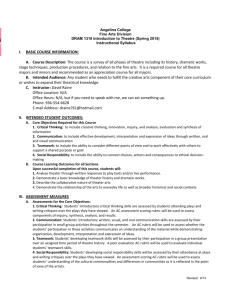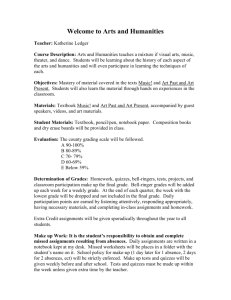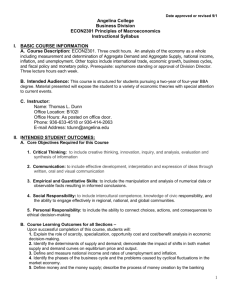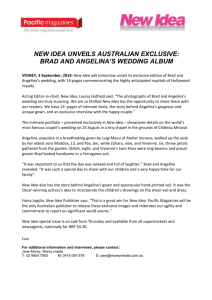Syllabus - Angelina College
advertisement
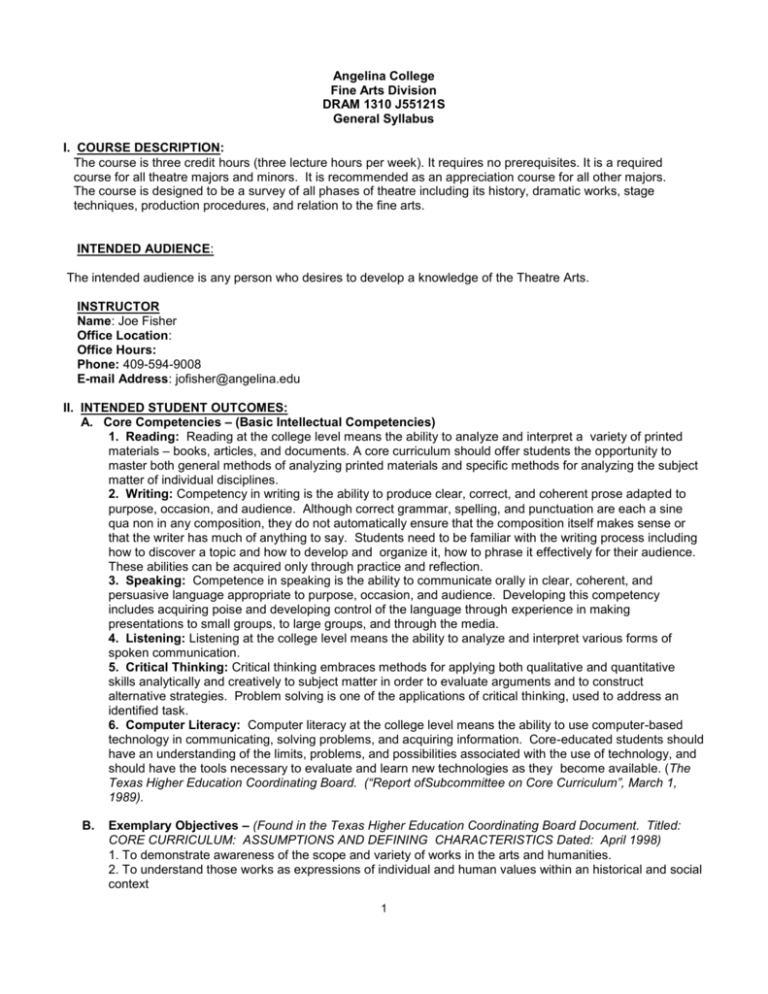
Angelina College Fine Arts Division DRAM 1310 J55121S General Syllabus I. COURSE DESCRIPTION: The course is three credit hours (three lecture hours per week). It requires no prerequisites. It is a required course for all theatre majors and minors. It is recommended as an appreciation course for all other majors. The course is designed to be a survey of all phases of theatre including its history, dramatic works, stage techniques, production procedures, and relation to the fine arts. INTENDED AUDIENCE: The intended audience is any person who desires to develop a knowledge of the Theatre Arts. INSTRUCTOR Name: Joe Fisher Office Location: Office Hours: Phone: 409-594-9008 E-mail Address: jofisher@angelina.edu II. INTENDED STUDENT OUTCOMES: A. Core Competencies – (Basic Intellectual Competencies) 1. Reading: Reading at the college level means the ability to analyze and interpret a variety of printed materials – books, articles, and documents. A core curriculum should offer students the opportunity to master both general methods of analyzing printed materials and specific methods for analyzing the subject matter of individual disciplines. 2. Writing: Competency in writing is the ability to produce clear, correct, and coherent prose adapted to purpose, occasion, and audience. Although correct grammar, spelling, and punctuation are each a sine qua non in any composition, they do not automatically ensure that the composition itself makes sense or that the writer has much of anything to say. Students need to be familiar with the writing process including how to discover a topic and how to develop and organize it, how to phrase it effectively for their audience. These abilities can be acquired only through practice and reflection. 3. Speaking: Competence in speaking is the ability to communicate orally in clear, coherent, and persuasive language appropriate to purpose, occasion, and audience. Developing this competency includes acquiring poise and developing control of the language through experience in making presentations to small groups, to large groups, and through the media. 4. Listening: Listening at the college level means the ability to analyze and interpret various forms of spoken communication. 5. Critical Thinking: Critical thinking embraces methods for applying both qualitative and quantitative skills analytically and creatively to subject matter in order to evaluate arguments and to construct alternative strategies. Problem solving is one of the applications of critical thinking, used to address an identified task. 6. Computer Literacy: Computer literacy at the college level means the ability to use computer-based technology in communicating, solving problems, and acquiring information. Core-educated students should have an understanding of the limits, problems, and possibilities associated with the use of technology, and should have the tools necessary to evaluate and learn new technologies as they become available. (The Texas Higher Education Coordinating Board. (“Report ofSubcommittee on Core Curriculum”, March 1, 1989). B. Exemplary Objectives – (Found in the Texas Higher Education Coordinating Board Document. Titled: CORE CURRICULUM: ASSUMPTIONS AND DEFINING CHARACTERISTICS Dated: April 1998) 1. To demonstrate awareness of the scope and variety of works in the arts and humanities. 2. To understand those works as expressions of individual and human values within an historical and social context 1 3. To respond critically to works in the arts and humanities. 4. To engage in the creative process or interpretive performance and comprehend the physical and intellectual demands required of the author or visual or performing artist. 5. To articulate an informed personal reaction to works in the arts and humanities. 6. To develop an appreciation for the aesthetic principles that guide or govern the humanities and arts. 7. To demonstrate knowledge of the influence of literature, philosophy, and/or the arts on intercultural experiences. C. Course Objectives – 1. The student will become familure with the history of the theatre and develop an appreciation for one of the oldest and most vital art forms in our culture. 2. The student will discern historical perspectives relating to elements of the theater. 3. The student will comprehend basic dramatic theory. 4. The students will understand the role of each member of the production company and their rolls in the development of a theatrical production. 5. The students will engage in the creative process or interpretive performance and comprehend the physical and intellectual demands required of the author or visual or performing artist. 6. The students will develop a critical appreciation for the aesthetic principles that guide or govern the art form. D. Course Objectives - 2 III. ASSESSMENT MEASURES OF STUDENT LEARNING OUTCOMES: A. Assessments for the Core Intellectual Competencies – 1. Reading – Reading at the college level means the ability to analyze and interpret a variety of printed materials – books, articles, and documents. A core curriculum should offer students the opportunity to master both general methods of analyzing printed materials and specific methods for analyzing the subject matter of individual disciplines. 2. Writing – Competency in writing is the ability to produce clear, correct, and coherent prose adapted to purpose, occasion, and audience. Although correct grammar, spelling, and punctuation are each a sine qua non in any composition, they do not automatically ensure that the composition itself makes sense or that the writer has much of anything to say. Students need to be familiar with the writing process including how to discover a topic and how to develop and organize it, how to phrase it effectively for their audience. These abilities can be acquired only through practice and reflection. 3. Speaking – Competence in speaking is the ability to communicate orally in clear, coherent, and persuasive language appropriate to purpose, occasion, and audience. Developing this competency includes acquiring poise and developing control of the language through experience in making presentations to small groups, to large groups, and through the media. 4. Listening – Listening at the college level means the ability to analyze and interpret various forms of spoken communication. 5. Critical Thinking – Angelina College defines critical thinking as the dynamic process of questioning preconceptions and biases through the gathering and evaluation of data to reach new conclusions that consider realistic implications and consequences. 6. Computer Literacy – Computer literacy at the college level means the ability to use computer-based technology in communicating, solving problems, and acquiring information. Core-educated students should have an understanding of the limits, problems, and possibilities associated with the use of technology, and should have the tools necessary to evaluate and learn new technologies as they become available. (The Texas Higher Education Coordinating Board. (“Report of Subcommittee on Core Curriculum”, March 1, 1989) B. Assessments for the Exemplary Objectives Specific to the Course – 1. Students will display a knowledge of the variety of theatrical works. 2. Students will be exposed to a variety of theatre forms from many historical periods with an emphasis on the theatrical conventions of a given societal code. 3. Students will be required to view the art form and critique it based on a predetermined set of criteria. 4. Students will be required to create a piece of theatre. 5. Students will have the opportunity to express their opinions on many performances both live (amateur) and recorded (professional). 6. Students will demonstrate through feedback and group activities an understanding of the point of view of many artists and their guiding aesthetic principles. 7. Students will gain an appreciation for theater’s influence on culture as a whole. C. Assessments for Objectives Specific to the Course – 1. Students will be given information on the technical and performance elements of play production. 2. Students will apply information on the technical and performance elements to specific societal theatrical conventions that reflect the historical time period in which they were produced. 3. Students will read and be quizzed over plays from a broad historical perspective. A discussion of the merits of the plays within the context of their historical production will be initiated. Reliance on learned dramatic theory will be emphasized. 4. Students are required to attend 10 hours of practicum activities. These hours are to be completed by working “hands on” or backstage in a production. The purpose is to give students insight into the actual demands of production and the roles and responsibilities of each member of a production staff. 5. Students will develop and participate in a ten-minute play which is guided by a set of standards outlined in class. 6. Students will be required to attend two performances of the current season. 7. Students are required to write an informed critique over the productions viewed. D. Assessments for the Objectives of the Course as determined by the Instructor – Methodologies, which are utilized in presenting course content, include but are not limited to lectures, class discussions, student presentations, audiovisual presentations, role-play activities, and small group activities. Generally each unit will begin with a lecture over the material followed by discussion and or class activities. 3 IV. INSTRUCTIONAL PROCEDURES: V. COURSE REQUIREMENTS AND POLICIES: A. Required Textbooks, Materials and Equipment – An Introduction to: The Art of Theatre, Author: Marsh Cassady [plays may be purchased by single copy in the college bookstore] Oedipus, by Sophocles Hamlet, by William Shakespeare Tartuff, by Molier Death of a Salesman, Aurther Miller Paper for note taking and pen or pencil. Additional Resource: The Supplemental Unit to Critical Thinking is available on Blackboard. Go to www.angelina.edu and click on Blackboard Log on information. Follow directions for accessing this unit regarding critical thinking. B. Assignments – All Assessments must follow written instructions and/or formats explained. Failure to do so will result in a significant grade reduction. Instructions for all written assignments will be distributed as assigned. Writing Assignments: Two play critiques of viewed productions are required. Each critique will be due the first class period following the performance or classroom viewing. A handout with critique guidelines will be distributed. This means you will be required to attend two productions. Angelina College students are admitted free but there is a charge for the non-student ($4 for children and seniors, $5 for adults). Please Check the Angelina College Department of Theatre Website for Performance Dates and Show Times Exams: There will be three exams covering the textbook, plays from the reading list, and lecture information. These exams will be a combination of question formats (multiple choice, true/false, fill in the blank, short essay). Reading Assignments: Students are required to read at least three plays for discussion and analysis. There will be quizzes over the plays you are to read. These quizzes will be multiple-choice and designed to test whether or not you have read the plays. Reading assignments from the texts will also be required. Other reading assignments in the form of handouts might be given throughout the semester. All assignments are to be read by the due date in the class schedule. Students must be prepared to discuss the material in a productive manner. Class Assignments: There will be class assignments for which you will receive a grade. Some of these assignments will require group presentation format. C. Course Policies – (This course conforms to the policies of Angelina College as stated in the Angelina College Handbook.) Academic Assistance – If you have a disability (as cited in Section 504 of the Rehabilitation Act of 1973 or Title II of the Americans with Disabilities Act of 1990) that may affect your participation in this class, you should see Karen Bowser, Room 208 of the Student Center. At a post-secondary institution, you must selfidentify as a person with a disability; Ms. Bowser will assist you with the necessary information to do so. Attendance – As the attendance policy in the Angelina college Policies & Procedures Manual states, instructors may drop students from class after 3 consecutive or 4 cumulative absences. However, it is ultimately YOUR responsibility to drop from class, or you may receive an “F” for your final grade. If you return to class after an extended absence, it is at the instructor’s discretion whether or not to allow you back into class. Because class participation is a vital part of your grade, you cannot pass my class without attending. Students are responsible for obtaining information missed due to an absence. Students are responsible for arranging to make up missed work. Habitual tardiness is not 4 attractive. Tardiness, absences, and leaving class early will negatively impact your class assignments grade. There is no differentiation between an excused or unexcused absence. All absences are treated with the same consequences listed below. WRITING assignments will be accepted late, but with daily point reductions. QUIZZES must be made up before the next class period or the student will receive a zero for that quiz. Students will have only one opportunity to reschedule missed EXAMS during the final week of the class and these missed exams will be in essay form. NO CLASS ASSIGNMENTS completed during a class period can be made up. Additional Specific Requirements for this Course - None VI. COURSE CONTENT: A. Content/ Topics This introduction to the theatre should instill the student with a basic understanding of the Where, What, When and How’s of the art form focusing primarily on relative historical perspectives, basic dramatic theory, and the roles/responsibilities of each member of the production company. Most importantly the course should help a student develop a critical appreciation of the art form. B. Additional Content None VII. EVALUATION AND GRADING: A. Grading Criteria Critiques of two plays Quizzes Exams Group presentations Daily Activities-Assignments 15% 15% 30% 10% 30% B. Determination of Grade completion of the above on a scale of 1-100. VIII. SYLLABUS MODIFICATION: The instructor may modify the provisions of the syllabus to meet individual class needs by informing the class in advance as to the changes being made. 5

